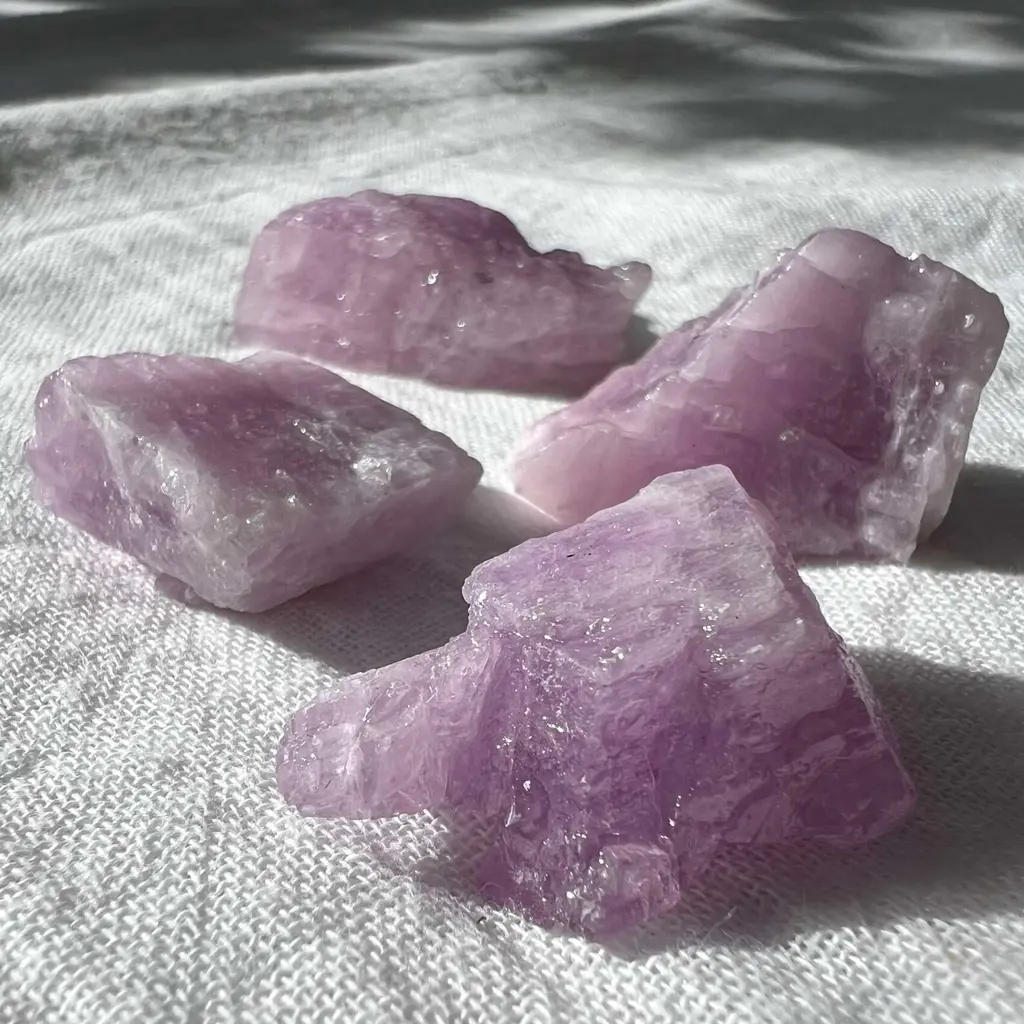Kunzite

Names
English name: Kunzite
Other english names: Lithia Amethyst, Lithionamethyst, Spodumene (variety), Pink Spodumene
Dutch name: Kunziet
French name: Kunzite
German name: Kunzit
Spanish name: Kunzita
Italian name: Kunzite
Healing and magic
Qualities:
- Calming
- Loving
- Emotionally supportive
- Spiritually protective
Physical healing properties:
- Aids heart and circulatory systems
- Supports hormone balance
- Assists in releaving tension
- Assists in releaving PMS
- Helps when you have a lot of fat concentrated on your belly
Psychological/emotional healing properties:
- Heals emotional trauma
- Promotes self-love
- Eases anxiety
- Reduces panic attacks
- Encourages emotional expression
- Heals emotional wounds of the inner child
- Assists in releasing negative feelings
- Mood booster
Magical facility:
- Love, Self-love
- Emotional healing
- Divine connection
- Protection, Aura protection, Ward away negative energy
- Femininity
- Forgiveness
- Higher vibrations
- Communication
- Honesty
- Confidence
- Personal growth
Magical uses and folklore:
- Used in love spells and rituals to attract gentle affection
- Helps with emotional expression
- Helps with communication with the Divine Feminine
- Protects the aura from unwanted energies
Chakras:
- Heart (main)
- Crown (secondary)
Zodiac signs:
- Taurus
- Leo
- Scorpio
Element: Water
Placement:
- Bedroom (especially near the bed)
- Meditation space
- Altar
- Therapy room
Works well with these crystals:
- Moonstone
- Clear Quartz
- Smithsonite
- Lithium Quartz
- Rhodonite
- Lapis Lazuli
- Rose Quartz
- Morganite
- Lepidolite
- Amethyst
Works well with these herbs:
- Rose
- Lavender
- Hawthorn
- Jasmine
Deity correspondences:
- Aphrodite
- Quan Yin
- Freyja
- Venus
- Brigid
Care
Cautions:
- Very sensitive to sunlight and heat, can fade
Durability: Fair (fragile compared to other gems)
Scratch resistance:Good (Mohs 6.5-7)
Toughness: Poor (can split or fracture easily)
Stability: Unstable to light and temperature changes
Sunlight exposure: Avoid prolonged exposure: fades
Water exposure: Short-term is okay but best avoided
Salt water exposure: Not recommended
How to store:
- Wrap in soft cloth
- Store away from light
- Store away from heat
Usage tips:
- Avoid heat
- Avoid sudden temperature changes
- Avoid prolonged sunlight
- Do not expose to harsh chemicals
- Do not expose to ultrasonic cleaners
- Best used in pendants or earrings rather than rings
How to physically clean:
- Wipe gently with soft cloth
- Use mild soap if necessary
How to metaphysically cleanse:
- Smoke cleansing: Lavender or Palo Santo
- Moonlight, full moon
- Selenite plate
How to charge:
- Full moon light
- Place on slab of Selenite
How to select:
- Choose intuitively by softness of color and calming energy
- Higher quality Kunzite has rich and saturated pink-to-lilac hues
Physical properties
How to identify:
- Pale to vibrant pink/lilac color
- Pleochroic: shows different colors from diffent angles
- Transparent to translucent
- Striated crystals
Occurence:
- Afghanistan
- Brazil
- USA (California)
- Madagascar
- Pakistan
Age distribution: 100 million to 2.5 billion years old
Usage:
- Jewelry (pendants, beads)
- Collectors' mineral
- Metaphysical tool
Price:
- Rough/tumbled: €5-€30 depending on size and quality
- Gem: €50-€500+ per carat depending on cut and quality
- Cluster: €100-€1000+ rare!
Rarity: Moderately rare (especially deep-colored Kunzite)
Lookalikes:
- Rose Quartz
- Morganite
- Pink Topaz
Variety of: Spodumene
Crystal system: Monoclinic
Colors: Pale pink to lilac (some yellowish or greenish hues under artificial light)
Luster: Vitreous (glassy)
Transparency: Transparent to translucent
Morphology: Typically forms in long, prismatic crystals with striations
Magnetism: Non-magnetic
Streak: White
Hardness: 6.5-7 Mohs (Harder than a knife)
Tenacity: Brittle
Cleavage: Perfect in two directions, can split easily
Fracture: Uneven to splintery
Density: 3.1-3.2 g/cm³
Chemical classification: Silicate (inosilicate)
Formula: LiAl(SiO₃)₂
Elements listed: Lithium (Li), Aluminum (Al), Silicon (Si), Oxygen (O)